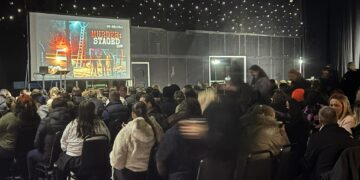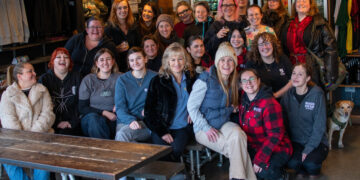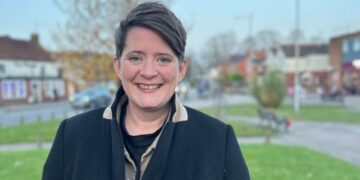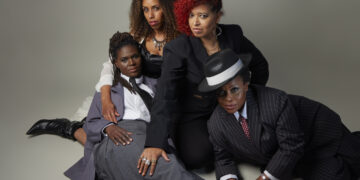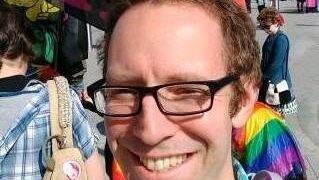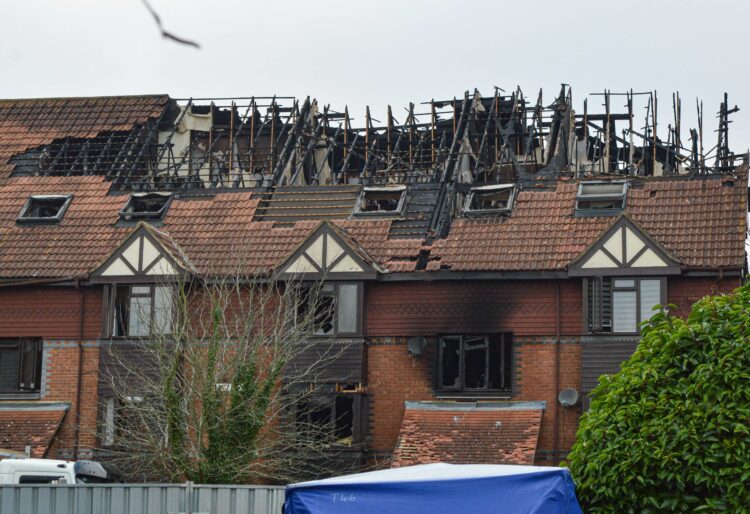Please note: This article contains two images of burn injuries which some may find distressing
FOLLOWING the sentencing of Hakeem Kigundu in connection with the arson at Rowe Court, one of those injured in the fire, Joel Richards, has spoken out about the incident.
After months of some animosity between Kigundu and other residents in the apartment building, he was due to be evicted after his tenancy had lapsed on Wednesday, December 15.
Mr Richards said that on the night of the incident: “I finished work about nine o’clock that night – I got in, went straight to bed, nothing different, nothing peculiar.
“When I heard this noise from the window, a guy downstairs shouting, so I looked out and said what’s the matter?
“He said ‘this guy has literally set the place on fire.'”
Mr Richards said he was then told to jump from the building but refused, intending to help others to escape.
“I said that there’s lots of people in the building, we need to try and save them, and he said ‘I don’t think you’ve got time, because the whole back’s on fire.’
“But I thought ‘okay, well I’ll try anyway.'”
Mr Richards explained how he could see his kitchen beginning to catch fire, and that the ceiling was “almost like marshmallow.”
He detailed how to put a coat on and soaked himself in the shower to protect from the flames and left his home.
“As I was going out, I tripped on something, and I thought straight away I kind of knew what it was – it was a body.
“I tried to grab this person, but the smoke is in my eyes and the petrol fumes, I just kept smelling it.
“So I grabbed him and tried to move him, but my hands were catching on fire, so I though ‘well, I can’t do anything.'”
Mr Richards then attempted to kick through his neighbour’s door to help them escape.
He explained how he helped a man and a pregnant woman jump from the building, but that he had been badly burned in the process.
“I was actually burned and had CO2 in my lungs, can’t really breathe, but I jumped.
“I remember passing out and then waking up and then passing out, and then I saw her jump and he was catching her.”
“I remember lying there and thinking ‘I’m not going to make this.'”
Despite this, he attempted to phone an ambulance and recalls how a lot of people were panicking and stepped over him.
He explained also how he underwent counselling after the event: “It was six months of counselling and therapy.
“It left me scarred, scared, nervous, and not wanting to live, but I was fortunate I had a really good therapist.”
Mr Richards said that he felt guilty for not being able to save more people despite his efforts in helping others escape.
“I had survivor’s guilt because of the people I didn’t save – I didn’t save Richard, I didn’t save Neil.
“And I knew these two people, I was close to Richard, we talked most days, so you don’t think about the two people you got out,
“You think about the people you didn’t get out, so I saw myself as doing just what anybody would do, but I’ve realised now not everybody would.
“I don’t know why I did, I can’t tell you why – something took over.”
He said that during his five years living in Rowe Court there was a neighbourly atmosphere: “We did the sugar and toilet rolls, and we all knew each other.”
When Kigundu moved into the complex, however, the relationships “went sour.”
“Everybody was really apprehensive of this guy, I was from day one because he would just walk past you and just barge you for no reason at all.
“Just hit you with his shoulder, sit in his van with his lights on in your window, for five hours or so, you’re trying to sleep.”
Kigundu was to be evicted from the flats after a number of complaints meant that his tenancy was not renewed by the landlord.
“That was his eviction day, the 15th of December,” Mr Richards said, explaining: “Me and Richard, we all were counting down as well.
“We’re like, it’d be gone soon, so I was I was happy on the 14th knowing that he was moving out.
“I didn’t think he would sort of try and get revenge this way.”
He said that the thing which bothers him most is the knowledge that Richard was trying to reach him.
“The fact that I know where he was, and I know it was my door he was trying to get to– I think that bothered me.
“And you do think like if it was a minute or two minutes earlier could have saved him.”
Mr Richards described his injuries, saying: “I’m fortunate– the burn’s unit has done amazing.
“But my whole face was burned and my hair, my ears, the back of my head, everything was burned.
“You can still see the fading on my hands.”
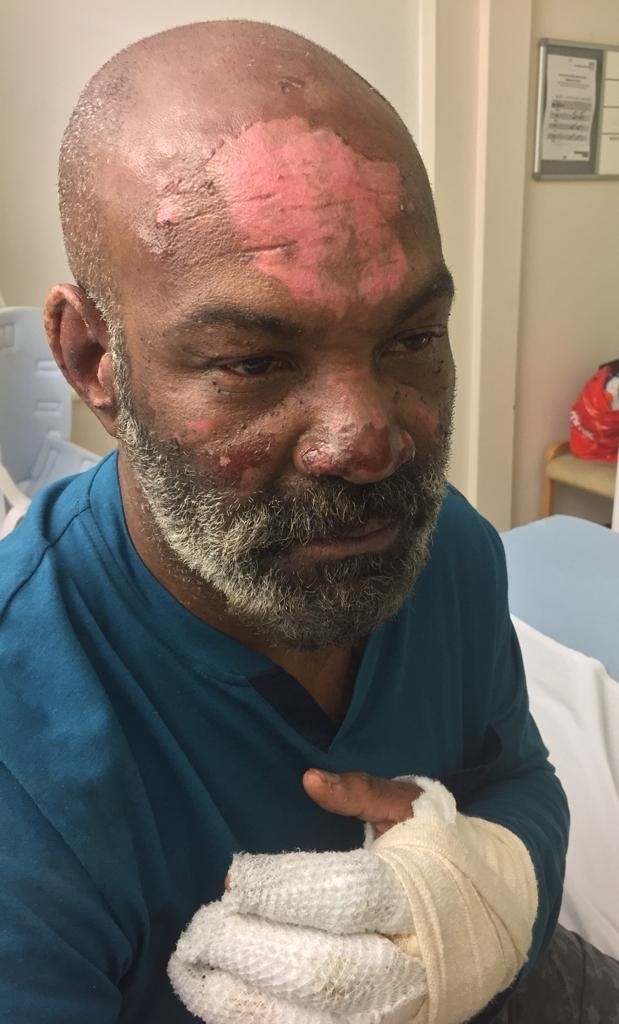
He was in hospital for a week, with doctors concerned that his injuries would become infected and lead to sepsis.
It took a month for him to be able to use his hands again, and had to rely on physiotherapy and help for things like cooking.
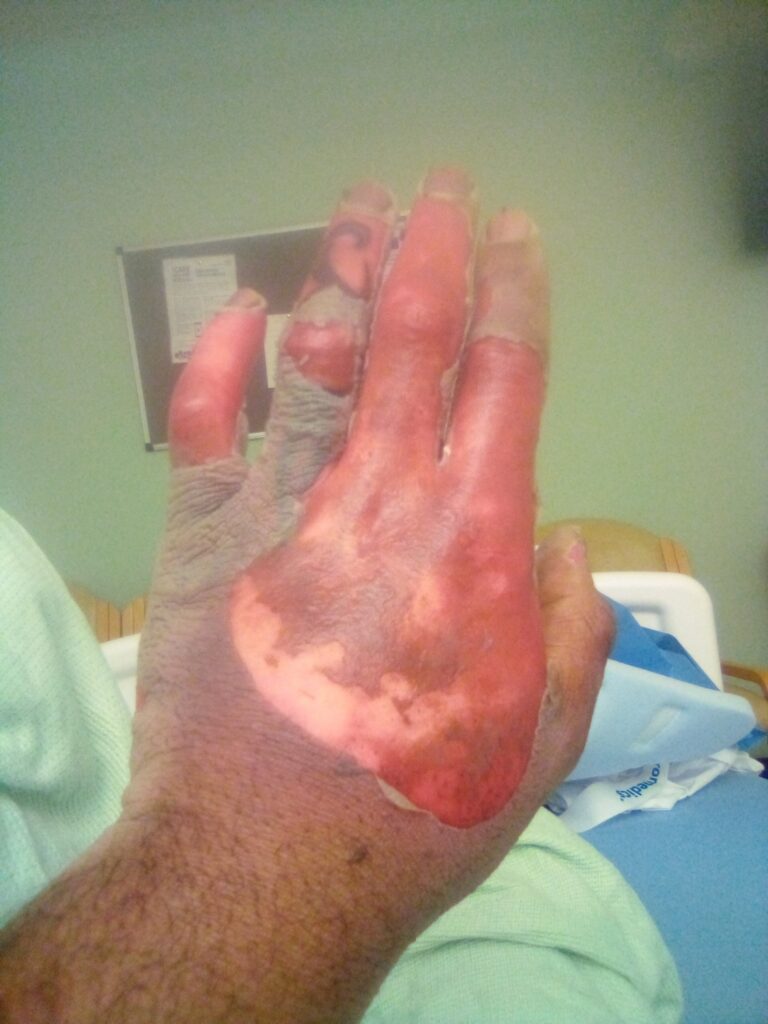
” I was just somehow wondering why am I still alive, because I can’t explain it.”
The fire destroyed much of the housing complex at Rowe Court, and Mr Richards says he lost everything he owned.
“Sentimental stuff, my child’s photos, everything I owned, so I had to build from scratch.
“I was left with one photo from my son, which is fortunate, and a driving licence was the only thing recovered from the fire.
“I even had no clothes– I came out [of hospital] with no bank account, and you don’t realise how difficult it is to set up a bank account when you’ve got no ID.
“You’ve got no way of proving who you are and it’s not even an address, because it’s burned down.”
He said that support from the community was instrumental in helping him return to normal life, saying: “I was warmed by it– Katia set up a GoFundMe account,” which he credits with getting him back on his feet.
“Donations from colleagues, and my family– without that you’ve got nothing.”
The incident has left him with flashbacks: “They almost freeze you.
“I can’t stand candles and anything that would cause a fire, like petrol stations, the smell of petrol bothers me.
“I don’t know if I’m gonna get back to the way it was, or maybe better than the person I was.”
He spoke of the two men who lost their lives in the fire, saying that Richard Burgess: “liked making films, but was more of a landscape gardener.”

“He was just the nicest guy, but he couldn’t handle the music and the noise all night.
“Neil was very similar, very calm people, and very nice.”
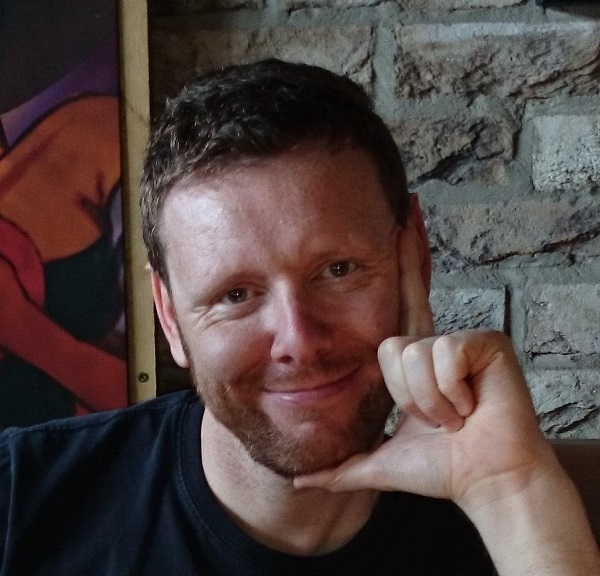
He contrasted this with Kigundu, who Richards recalled being confrontational.
“When everybody was wearing masks and COVID he decided to wear balaclava– almost attention seeking, and seemed very sure of himself.
“Very confrontational, aggressive, very abusive when he felt like he smelled like a cigarette smell coming into his flat.
“He would challenge people, just looking for trouble, just looking to irritate people.”
Following the sentencing, Kigundu was given a whole life sentence with no minimum term.
“For me is a terrorist, he doesn’t have to have a religious belief to be a terrorist, you just have to have a cause and it’s no different for me.”
Mr Richards also said that Kigundu kept voice notes which document the planning of the incident over a number of days.
“He kept his diary, just like what he’s going to do to us, and I think he called it Plan A.
“I don’t know if he blamed us– I think he had a few reports from the neighbours about him sitting outside in his van making lots of noise and playing loud music.
“He lost his job and he’d lost his flat, so he thinks it’s we’re directly responsible for that.”
Now that the sentence has been passed down, Richards says he is still rebuilding his life.
“I wish that never happened– I had a good life, and now to remember what my life was, it’s very difficult because it hurts to look back.
“You know, pictures of my sons, everything my dad left me – a lot – he left a shoebox full of stuff, and it meant a lot to me, but that’s gone.”
“I’ve got one son, I’m here for him, but I don’t get that feeling when people say you’re really lucky to get out alive, I don’t feel lucky.
“What would have been lucky is if I got everybody out – I don’t think I could feel lucky on my own.”
Kigundu will now serve a whole life term in prison, with no minimum term.



